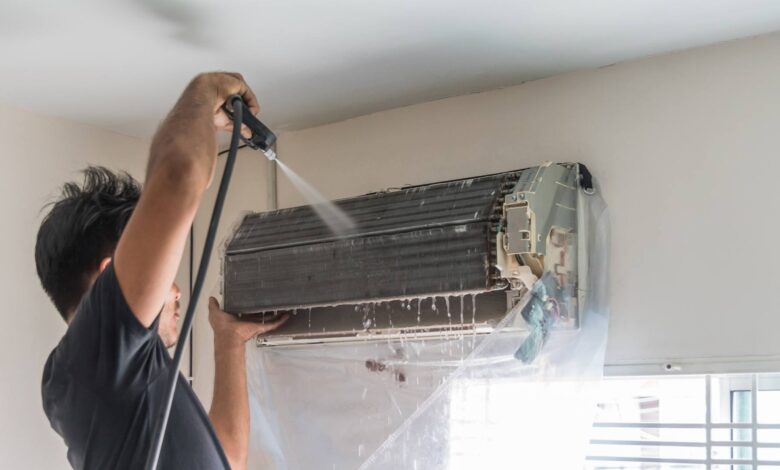The Impact Of Air Conditioning On Heat-Related Illnesses

Heat-related illnesses have gained prominence as a result of climate change’s increasing temperatures. Air conditioning systems are vital in protecting us from dangerously high temperatures, and that’s why their maintenance is necessary. Aircons should be cleaned by chemical wash to fix aircon leaking problems and other issues.
https://www.socool.sg/ can help you in giving chemical wash to your aircon. This article will discuss the benefits and drawbacks of air conditioning in connection to heat-related illnesses.
Air Conditioning’s Perks:
Having air conditioning can help reduce heat-related illnesses in a number of ways. Air conditioning systems make a building more inhabitable by lowering the temperature inside, which in turn reduces the likelihood of heat exhaustion and heat stroke.
Air conditioning also aids in controlling humidity, which can lead to overheating and subsequent dehydration. The use of air conditioning is helpful, but it is not a cure. Maximizing its benefits while limiting any potential health hazards requires careful use and regular upkeep.
Potential Health Risks of Air Conditioning:
Although air conditioning is a welcome relief from the heat, improper use can have negative effects on one’s health. Moving from an air-conditioned space to the outdoors can cause a rapid temperature change, which can be uncomfortable for certain people.
This can put stress on the body’s ability to respond to changing temperatures, increasing the risk of respiratory and circulatory problems. Poor ventilation is another issue that needs to be addressed. Without regular cleaning, air conditioning systems may become a breeding ground for dust, allergies, and other pollutants.
Allergies, asthma episodes, and other respiratory issues can be worsened by poor air quality. Maintaining clean and healthy indoor air requires regular cleaning and maintenance of air conditioning units, including the replacement of filters.
The body’s natural capacity to endure heat can be diminished if people constantly expose themselves to cool environments. People who spend a lot of time indoors where it’s cool may become too sensitive to hot temperatures and more likely to get sick in the heat of summer.
Striking a Balance:
Finding an appropriate balance between the benefits of air conditioning and its drawbacks is the key to maximizing their utility. Here are some things to keep in mind:
- Make sure the temperature isn’t too high or too low: Having the air conditioner set too low can be uncomfortable. Select a setting that will provide comfort without significantly altering the temperature differential between indoors and out.
- Maintain a healthy airflow: When the weather permits, throw open the windows and turn on the fans to let in some fresh air. In addition to lowering the need for air conditioning, this also keeps you in touch with nature.
- Keep up with AC maintenance: It is important to maintain good indoor air quality by regularly cleaning or replacing air filters. Keep the system working well by booking regular expert maintenance.
- Gradually acclimate to temperature changes: Allow your body some time to readjust to the outside temperature while coming from an air-conditioned environment. This helps keep your body from being subjected to a rapid shock.
- Keep your body hydrated: Even if you’re inside with the air conditioning, make sure to stay hydrated. This aids in preventing low water levels and dehydration.
Importance of Heat Prevention Education:
While air conditioning is helpful in reducing the risk of heat-related disease, it is essential to stress the value of education on the subject. Knowing the symptoms of heat exhaustion and heatstroke, as well as how to respond in an emergency, might prevent serious health complications or even death.
People can be warned about the dangers of severe heat and taught about the significance of staying hydrated, dressing appropriately, and seeking shade or cool places through public awareness programs. The rate of heat-related disorders can be drastically decreased by combining the advantages of air conditioning with preventative measures.
The Impact on Vulnerable Populations:
Heat-related illnesses disproportionately affect the elderly, young children, and people with pre-existing medical issues. The cooling effect of the air conditioner is crucial to ensuring their safety and wellbeing.
The aged, as one example, may have a lower heat tolerance and a more difficult time maintaining a healthy internal temperature. They can get relief from the heat and delay the occurrence of heat-related illnesses by seeking refuge in buildings equipped with air conditioning.
Because of their increased metabolic rate and reduced ability to control body temperature, children are especially at risk. Schools, day-cares, and houses with air conditioning provide a cool, comfortable place for children to learn and play and reduce the likelihood of heat-related illnesses.
Some people’s pre-existing medical issues, such heart disease or asthma, might become much worse in hot weather. Stable indoor temperatures are easier for their bodies and better for their health thanks to air conditioning.





